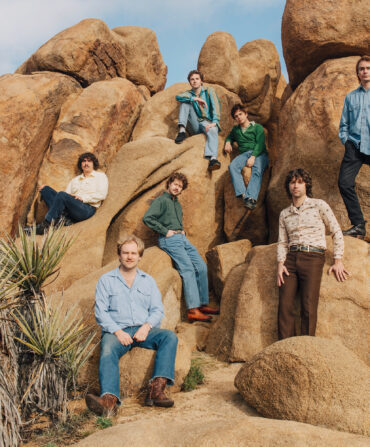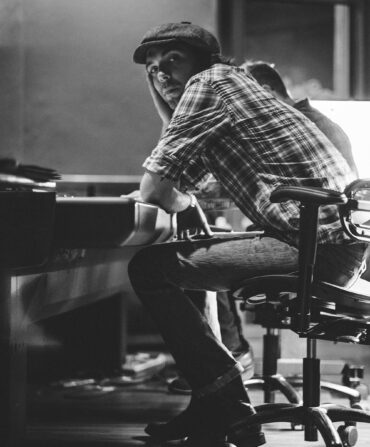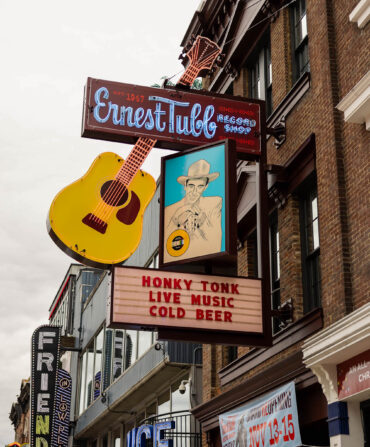Editor’s note: The following originally appeared in the G&G book Southern Women: More than 100 Stories of Innovators, Artists, and Icons. The book features interviews with, odes to, and essays by musicians, actors, artists, designers, entrepreneurs, authors, chefs, public servants, and more who have roots in the region.
Amy Ray and Emily Saliers met as grade schoolers in Decatur, Georgia, two curious girls searching for meaning and magic through music. In 1985, while in college at Emory University, they formed their band, the Indigo Girls, and proceeded to reinvent and recast Americana folk and rock from a female perspective, with cerebral lyrics and deep, soulful questions that reverberated in the hearts of listeners and made the pair a worldwide phenomenon. Throughout all the success and recognition, Ray and Saliers chose to remain in their home state, raising their own families amid the same magnolias and sticky heat.
How did your friendship form?
Emily Saliers: We both will probably answer this the same way. Amy was a year younger than I was in school and you don’t really, like, hang out with the different age groups, ya know? But I was definitely aware that she was the other girl in elementary school who played guitar.
Amy Ray: I remember seeing Emily play, and then when we got into high school, we were both in chorus together, right, Emily?
ES: Yeah, and our families lived relatively close together. . .
AR: And then there was a talent show and we decided we would try to do a song together. We got together in the basement of my house and we would learn cover songs and play them in our English classroom for our teacher Mr. Lloyd.
ES: Mr. Lloyd was the catalyst for us learning songs with the goal of performance. We were also writing songs by that point. We really wanted to infiltrate our set list with original material from very, very early on. And then it just became our favorite thing in the world to do. To get together and learn music and play.
Was there a moment when you each realized there was something really special about your collaboration?
ES: When we started to arrange our songs together. Amy had more of a rock style. She had a lower voice and I have a higher voice, and I was more of a picker. So immediately we just covered different ground together. It was much more interesting than us both doing the same thing. It was really satisfying on many levels.
AR: I remember when we first started playing together it was an emotional epiphany for me, like, This is what I want to be doing. I sang in the church choir, but I didn’t really know how to do anything beyond just my little church parts that my choir director taught me. With Emily, she could pretty much sing harmony to anything. It was like, Wow, this is a different experience. I’d been trying to be in these rock bands with different guys in my church and it never seemed to work out.
Why not?
AR: They just were completely inflexible. And I remember I showed up for practice one day and they had fired me. They came to the door and said, “You’re not in the band anymore.” Because I couldn’t sing Led Zeppelin the right way or something. With Emily, she was someone willing to really work with me on what I could do.
ES: Amy and I became really, really close friends at the same time that we were writing songs. We got our fake IDs, started playing at local bars. The goal was always to get the next best gig, whatever that was.
AR: A lot of our style we came upon because I didn’t know what I was doing at first. Back then, I couldn’t play the same chord fingerings that Emily could because I wasn’t as advanced. So I would learn a simpler version. I learned the harmony parts as if they were melodies, and I would do countermelodies because it was easier. We had our handicaps. And that was also a great thing, because I was working with someone who didn’t see it as a drawback. It was like, “Oh we’ll just work around that.”
Do you classify yourselves as Southern musicians?
AR: I do.
ES: We are Southern musicians because we’re from the South. I mean, Amy is fourth generation. But I never thought about us as characterized in the way that you might, say, Lynyrd Skynyrd, even though our songs have all kinds of South in them, particularly Amy’s songs.
AR: The Indigo Girls don’t have that “Southern music” identification musically, but I think lyrically and philosophically we are of the South. And that influenced everything from our business model to how we approach activism. When we were growing up in Atlanta, the Southern music scene had a different vibe than a lot of other regions because you helped each other out. It’s a community, you share gigs, it’s a slower pace. Politically, we’re in the birthplace of the civil rights movement, which has a spiritual base and a spiritual heart, which we could easily relate to and be part of and be educated by. And I think we could relate to it because we both had spiritual foundations.
How important is spirituality to both of you and your work?
ES: At this point, there’s no life for me without my faith. I have a song called “Come a Long Way” that is a thank-you for the spiritual help that’s gotten me through the worst of my struggles. I grew up Methodist, my mom was Presbyterian, my dad is a theologian. We’d go to church, then come home and eat something special, like a roast chicken, and sit around and talk about what we’d absorbed that day. We were allowed to ask questions, so I was able to see the beauty in spiritual life and faith. But then in the same breath, I know so many people who were wounded by organized religion. Both those things play in my mind when I write songs and think about the human struggle.
AR: Faith is one of the things that link me and Emily. My granddad had been a Methodist preacher in Florida. He raised money to build churches in the South. I went to Friday night youth group, Sunday Bible school, Sunday service, Wednesday choir practice, from six years old on. Our church was conservative. And I had to find my way through that. I had one youth minister who I could talk to about any questions I had. He saw me struggle with my sexuality. He saw me struggle with alcohol and drugs. I could go to him and it was a safe place for me. So even though church could be oppressive and taught me self-hate, it also set me free in a lot of ways.
That’s a very Southern experience—the contradictions knotted together in our institutions.
AR: Yes. It’s still my construct in that Joseph Campbell way, the way I make sense of the world even though I know it’s myth, you know? Jesus is still the thing I can relate to. I write a gospel song and Jesus is in the middle of it. I wouldn’t be anything without my spirituality, but at the same time I know there are a lot of things that are problematic about my attachment to it. The church we grew up in, the Methodist church, it’s still homophobic. It’s a slow-to-change thing.
You’ve both stayed in Georgia, where you grew up. Why?
ES: If we wanted to, I suppose Amy and I could’ve lived anywhere. But there’s so much about this place, the important dialogue that happens between African Americans and whites and Hispanics. Atlanta is hugely multicultural. The South also has a pace that’s more suited to me. It’s like what Amy described, when we were coming up, everybody wanted everybody else to do well. And then there’s the beauty of the South, little things like boiled peanuts and peach trees—the quiet, quiet beauty of the South resonates with me. It’s just home through and through. I cannot think of any other place in the country or the world that I would live if I could snap my fingers and be there.
AR: I’m on the same page as Emily about all that. Not to say we haven’t felt the weight of sexism and homophobia. For me, it’s about family legacy and history and how much I love this place, and of course I want my daughter to love it, too. It’s important to raise her here because this is where I have my roots. I want her to understand where people are coming from.
ES: Yeah, I think I also want . . . Sorry, Ame, were you done with that thought?
AR: Yeah, go ahead.
ES: Okay, what Amy’s describing—the South is a perfect place to rear a kid, to grow up among these dichotomies. My daughter Cleo’s being reared in an environment that talks all the time about what’s going on in this country and celebrating differences. We’re learning about being a human being in the South and the history that we struggle with. To me, philosophically that’s what life is all about—holding the sorrow with the joy and seeing their equal weight and importance.
What do you love the most about the other?
ES: Awww.
AR: Well, there are so many things. I love what she does musically. I love Emily’s ability to constantly evolve. Her willingness to look at herself and the context of the world and analyze how she can effect change or make a difference. She’s rooted in a conviction that has to do with the greater mystery of life. She’s always doing the work. That’s invaluable and makes it possible to do what we do as a partnership.
ES: This question makes me feel emotional because I want to tell you twenty million things, you know? But I could almost have a bumper sticker on my car that says, What Would Amy Do? Because one of the things I love most about Amy is the depth of her integrity. I don’t know if I’ve ever met anybody else with that rootedness and conviction. When you say someone’s “a good person,” Amy through and through is a good person. I always feel like I’m about five years behind her in what she’s learned about life. We are so different from each other. But Amy is at the center of everything for me.
AR: Wow.
ES: It’s true, man. I’m just telling my truth.
Allison Glock has been a magazine journalist and author for twenty-plus years. Her writing has appeared in the New York Times, the New York Times Magazine, Esquire, Rolling Stone, Men’s Journal, Marie Claire, GQ, the New Yorker, ESPN the Magazine, and many other publications.
Garden & Gun has an affiliate partnership with Bookshop.org and may receive a portion of sales when a reader clicks to buy a book. All books are independently selected by the G&G editorial team.








